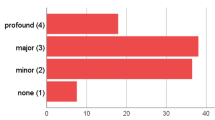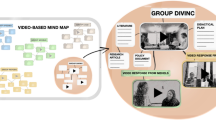Abstract
Internships in science research settings have received increasing attention as a means of helping students construct appropriate understandings, practices, tools, and language in scientific activities. To advance student–scientist partnerships beyond the status quo, the study aimed to investigate how cogenerative dialogs (cogens) may help high school students and scientists identify and address challenges collectively. The analysis identified nine major challenges discussed during cogens: (1) the quality and progress of scientific practice in laboratories, (2) the quality of scientists’/assistants’ instructions in classrooms, (3) the quality of student participation in classrooms and homework, (4) students’ absences, including arriving late or leaving early, (5) the quality of administrative support, (6) preparation for scientific presentations, (7) the process of deciding project topics, (8) students’ peer interactions and communication, and (9) students’ physiological needs. The three most salient challenges were “the quality and progress of scientific practice in laboratories” (39%), “the quality of scientists’/assistants’ instructions in classrooms” (20%), and “the quality of student participation in classrooms and homework” (17%). The study shows that cogens allowed students and scientists to agree on teaching modifications that positively influenced teaching and learning processes during the internship, such that issues were reduced from the beginning to the closing stages. Importantly, the challenges and solutions identified by students and scientists in this study provide accounts of first-hand experience as well as insights to aid program directors or coordinators in designing a learning environment that can foster effective practice for internships by avoiding the issues identified in the study.
Similar content being viewed by others
References
Abraham, L. M. (2002). What do high school science students gain from field-based research apprenticeship programs? The Clearing House, 75(5), 229–232. https://doi.org/10.1080/00098650209603945.
Barab, S. A., & Hay, K. E. (2001). Doing science at the elbow of experts: issues related to the science apprenticeship camp. Journal of Research in Science Teaching, 38(1), 70–102. https://doi.org/10.1002/1098-2736(200101)38:1<70::AID-TEA5>3.0.CO;2-L.
Bayne, G. U. (2012). Capturing essential understandings of the urban science learning. Learning Environments Research, 15(2), 231–250. https://doi.org/10.1007/s10984-012-9112-8.
Bell, R., Blair, L., Crawford, B., & Lederman, N. (2003). Just do it? The impact of a science apprenticeship program on high school students’ understandings of the nature of science and scientific inquiry. Journal of Research in Science Teaching, 40(5), 487–509.
Bhabha, H. K. (1994). The location of culture. New York, NY: Routledge.
Bondi, S. (2013). Using cogenerative dialogues to improve teaching and learning. About Campus, 18(3), 2–8. https://doi.org/10.1002/abc.21117.
Braun, V., & Clarke, V. (2006). Using thematic analysis in psychology. Qualitative Research in Psychology, 3(2), 77–101 https://doi.org/10.1191/1478088706qp063oa.
Burgin, S. R., & Sadler, T. D. (2016). Learning nature of science concepts through a research apprenticeship program: a comparative study of three approaches. Journal of Research in Science Teaching, 53(1), 31–59. https://doi.org/10.1002/tea.21296.
Charney, J., Hmelo-Silver, C. E., Sofer, W., Neigeborn, L., Coletta, S., & Nemeroff, M. (2007). Cognitive apprenticeship in science through immersion in laboratory practices. International Journal of Science Education, 29(2), 195–213. https://doi.org/10.1080/09500690600560985.
Chauhan, M. (2013). Effects of the cogenerative dialogue teaching method in a community college general chemistry course. Journal of College Science Teaching, 42(6), 14–18.
Daley, S. M. (2000). Public science day and the public understanding of science in America. Public Understanding of Science, 9(2), 175–181. https://doi.org/10.1088/0963-6625/9/2/306.
Emdin, C. (2011). Citizenship and social justice in urban science education. International Journal of Qualitative Studies in Education, 24(3), 285–301. https://doi.org/10.1080/09518398.2010.539582.
Falloon, G. (2013). Forging school-scientist partnerships: a case of easier said than done? Journal of Science Education and Technology, 22(6), 858–876. https://doi.org/10.1007/s10956-013-9435-y.
Gibson, H. L., & Chase, C. (2002). Longitudinal impact of an inquiry-based science program on middle school students’ attitudes toward science. Science Education, 86(5), 693–705. https://doi.org/10.1002/sce.10039.
Grindstaff, K., & Richmond, G. (2008). Learners’ perceptions of the role of peers in a research experience: implications for the apprenticeship process, scientific inquiry, and collaborative work. Journal of Research in Science Teaching, 45(2), 251–271. https://doi.org/10.1002/tea.20196.
Guba, E., & Lincoln, Y. (1989). Fourth generation evaluation. Beverly Hills, CA: SAGE.
Gupta, P. (2009). Identity development in pre-service teachers who are explainers in a science center: dialectically developing theory and praxis. Unpublished doctoral dissertation, Graduate Faculty in Urban Education, City University of New York.
Harris, J. B., Freeman, T. L., & Aerni, P. W. (2009). On becoming educational researchers: the importance of cogenerative mentoring. Mentoring & Tutoring: Partnership in Learning, 17(1), 23–39. https://doi.org/10.1080/13611260802658546.
Higgins, J., & Bonne, L. (2014). Exploring classroom life through cogenerative dialogues. Cultural Studies of Science Education, 9(1), 53–61. https://doi.org/10.1007/s11422-013-9558-8.
Hsu, P.-L., & Roth, W.-M. (2010). From a sense of stereotypically foreign to belonging in a science community: ways of experiential descriptions about a high school students’ science internship. Research inScience Education, 40, 291–311. https://doi.org/10.1007/s11165-009-9121-5.
Kapur, M. (2008). Productive failure. Cognition and Instruction, 26(3), 379–424. https://doi.org/10.1080/07370000802212669.
Lawless, J. G., & Rock, B. N. (1998). Student-scientist partnerships and data quality. Journal of Science Education and Technology, 7(1), 5–13. https://doi.org/10.1023/A:1022575914118.
Lee, H.-S., & Songer, N. B. (2003). Making authentic science accessible to students. International Journal of Science Education, 25(8), 923–948. https://doi.org/10.1080/09500690305023.
Martin, S. (2006). Where practice and theory intersect in the chemistry classroom: using cogenerative dialogue to identify the critical points in science education. Cultural Studies of Science Education, 1(4), 693–720. https://doi.org/10.1007/s11422-006-9031-z.
Martin, S., & Scantlebury, K. (2009). More than a conversation: using cogenerative dialogues in the professional development of high school chemistry teachers. Educational Assessment, Evaluation and Accountability, 21(2), 119–136. https://doi.org/10.1007/s11092-008-9062-y.
Masson, A.-L., Klop, T., & Osseweijer, P. (2016). An analysis of the impact of student-scientist interaction in a technology design activity, using the expectancy-value model of achievement related choice. International Journal of Technology and Design Education, 26(1), 81–104. https://doi.org/10.1007/s10798-014-9296-6.
McCombs, G. B., Ufnar, J. A., & Shepherd, V. L. (2007). The virtual scientist: connecting university scientists to the K–12 classroom through videoconferencing. Advances in Physiology Education, 31(1), 62–66. https://doi.org/10.1152/advan.00006.2006.
Mumba, F., Mejia, W. F., Chabalengula, V. M., & Mbewe, S. (2010). Resident scientists’ instructional practices and their perceived benefits and difficulties of inquiry in schools. Journal of Baltic Science Education, 9, 187–195 Retrieved from http://www.jbse.webinfo.lt/journal.htm.
National Research Council. (1996). National science education standards. Washington, DC: National Academy Press.
Ritchie, S. M., & Rigano, D. L. (1996). Laboratory apprenticeship through a student research project. Journal of Research in Science Teaching, 33(7), 799–815. https://doi.org/10.1002/(SICI)1098-2736(199609)33:7%3C799::AID-TEA6%3E3.0.CO;2-I.
Rodriguez, N. N. (2013). Reconciling learning and teaching styles in science, technology engineering and mathematics disciplines through cogenerative dialogues. Problems of Education in the 21st Century, 52, 105–113.
Roth, W.-M., Tobin, K., & Zimmerman, A. (2002). Coteaching/cogenerative dialoguing: learning environments research as classroom praxis. Learning Environments Research, 5(1), 1–28. https://doi.org/10.1023/A:1015662623784.
Sadler, T. D., Burgin, S., McKinney, L., & Ponjuan, L. (2010). Learning science through research apprenticeships: a critical review of the literature. Journal of Research in Science Teaching, 47(3), 235–256. https://doi.org/10.1002/tea.20326.
Scantlebury, K., Gallo-Fox, J., & Wassell, B. (2008). Coteaching as a model for preservice secondary science teacher education. Teaching and Teacher Education, 24(4), 967–981. https://doi.org/10.1016/j.tate.2007.10.008.
Shady, A. (2014). Negotiating cultural differences in urban science education. Cultural Studies of Science Education, 9(1), 31–51. https://doi.org/10.1007/s11422-013-9486-7.
Shein, P. P., & Tsai, C. Y. (2015). Impact of a scientist–teacher collaborative model on students, teachers, and scientists. International Journal of Science Education, 37(13), 2147–2169. https://doi.org/10.1080/09500693.2015.1068465.
Simpson, A., & Maltese, A. (2017). “Failure is a major component of learning anything”: the role of failure in the development of STEM professionals. Journal of Science Education and Technology, 26(2), 223–237. https://doi.org/10.1007/s10956-016-9674-9.
Siry, C., & Martin, S. N. (2014). Facilitating reflexivity in preservice science teacher education using video analysis and cogenerative dialogue in field-based methods courses. Eurasia Journal of Mathematics, Science & Technology Education, 10(5), 481–508. https://doi.org/10.12973/eurasia.2014.1201a.
Stake, J. E., & Mares, K. R. (2005). Evaluating the impact of science-enrichment programs on adolescents’ science motivation and confidence: the splashdown effect. Journal of Research in Science Teaching, 42(4), 359–375. https://doi.org/10.1002/tea.20052.
Tobin, K. (2006). Learning to teach through coteaching and cogenerative dialogue. Teaching Education, 17(2), 133–142.
Tobin, K. (2008). Fostering science learning in diverse urban settings. In C. Henderson, M. Sabella, & L. Hsu (Eds.), 2008 physics education research conference (pp. 50–52). Melville, NY: American Institute of Physics. https://doi.org/10.1063/1.3021271.
Varelas, M., House, R., & Wenzel, S. (2005). Beginning teachers immersed into science: scientist and science teacher identities. Science Education, 89(3), 492–516. https://doi.org/10.1002/sce.20047.
Wassell, B. A., Martin, S. N., & Scantlebury, K. (2013). Using cogenerative dialogues to foster community and support English language learner students’ learning. TESOL Journal, 4(4), 759–771. https://doi.org/10.1002/tesj.109.
Wigbels, L. D. (2004). The GLOBE program: a worldwide student/scientist partnership in earth science research and education. Acta Astronautica, 55(3-9), 701–706. https://doi.org/10.1016/j.actaastro.2004.05.04.
Funding
This material is based upon work supported by the National Science Foundation under Grant No. DRL 1322600.
Author information
Authors and Affiliations
Corresponding author
Ethics declarations
Disclaimer
Any opinion, findings, and conclusions or recommendations expressed in this material are those of the authors and do not necessarily reflect the views of the National Science Foundation.
Human and Animal Rights
All procedures performed in this study involving human participants were in accordance with the ethical standards of the institutional and/or national research committee and with the 1964 Helsinki declaration and its later amendments or comparable ethical standards.
Informed Consent
Informed consent was obtained from all individual participants included in the study.
Conflict of Interest
Pei-Ling Hsu has received research grants from National Science Foundation.
Rights and permissions
About this article
Cite this article
Hsu, PL. Using Cogenerative Dialogs to Improve Science Teaching and Learning: Challenges and Solutions in High School Students’ Internships. J Sci Educ Technol 27, 481–491 (2018). https://doi.org/10.1007/s10956-018-9737-1
Published:
Issue Date:
DOI: https://doi.org/10.1007/s10956-018-9737-1




